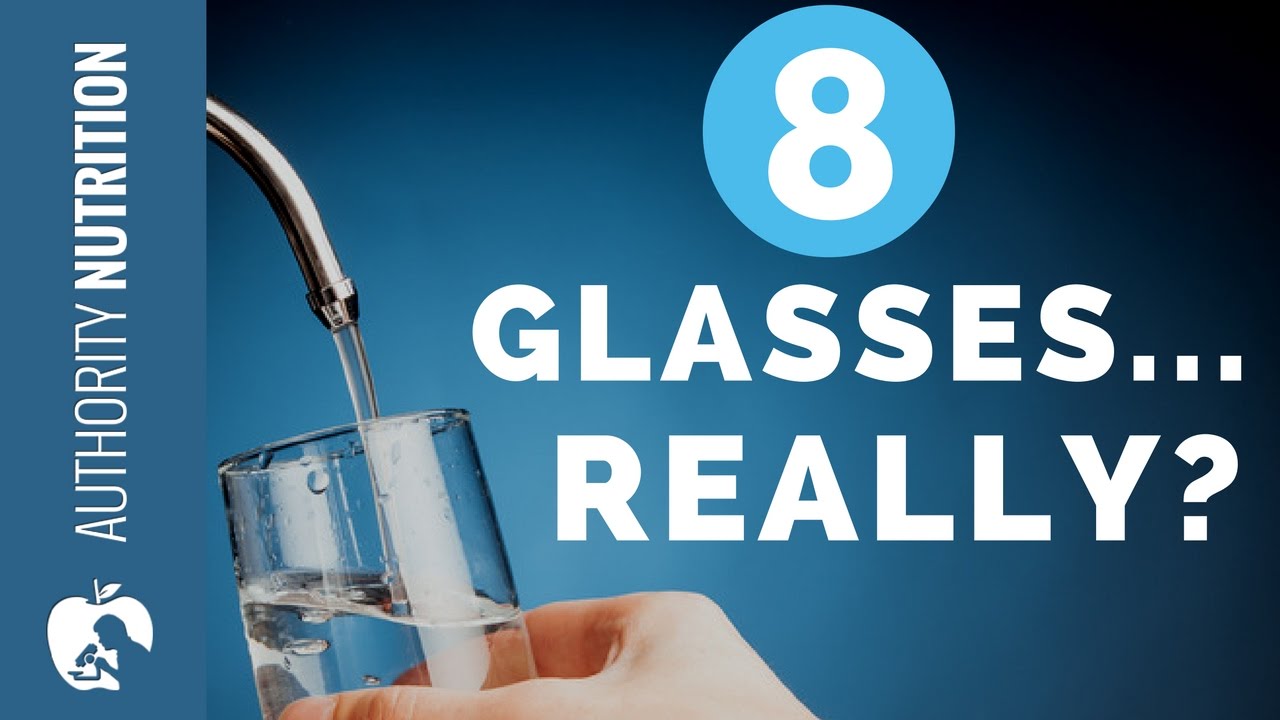How Much Water Should You Drink Per Day?

How Much Water Should You Drink Per Day?
Maintaining water balance is essential for our survival.
For this reason, our body has some intricate mechanisms for regulating when and how much we drink.
When our total water content goes below a certain level, thirst kicks in. This is controlled by mechanisms similar to things like breathing… we don’t need to consciously think about it.
For most there probably isn’t any need to worry about water intake at all… the thirst instinct is very reliable and has managed to keep us humans alive for a very long time.
Then there’s also the benefits of staying hydrated for optimal physical and mental function, bowel habits and maybe even for weight loss. This could be why there are recommendations to have eight 8-ounce glasses of water per day.
Interestingly, there really is no actual science behind the 8×8 rule though.
This study found it’s completely arbitrary, and it really depends on the individual person. That being said, the author does emphasize that certain circumstances may call for increased water intake, more than simple thirst commands.
Water need is increased during breastfeeding, as well as several disease states like vomiting and diarrhea.
Older people may need to consciously watch their water intake too, because it seems that the thirst mechanisms can start to malfunction in old age.
Then of course we also need more during times of increased sweating, like exercise or hot weather.
Additionally I thought it’s worth mentioning that plain water is not the only thing that contributes to fluid balance. Other drinks, including tea and coffee, and even foods can all influence and increase hydration status.
At the end of the day, no one can tell you exactly how much water you need.
Do some self experimentation… some people may function better with more water than usual, while for others it only causes the inconvenience of more frequent trips to the bathroom.
If you want to keep things simple (always a good idea), then these guidelines should apply to 90% of people, and they are very similar to our guidelines for how many meals you should eat per day:
When thirsty, drink.
When not thirsty anymore, stop.
During high heat and exercise, drink more to compensate for the lost fluids.
That’s it.
Studies mentioned:
STUDY 1: https://www.ncbi.nlm.nih.gov/pubmed/12376390



![[ID: Hx_A0iLhdr8] Youtube Automatic](https://bizimtube.com/wp-content/uploads/2021/03/id-hxa0ilhdr8-youtube-automatic-236x133.jpg)
![[ID: lp7w0UmpuIs] Youtube Automatic](https://bizimtube.com/wp-content/uploads/2021/03/id-lp7w0umpuis-youtube-automatic-236x133.jpg)
![[ID: s2-7T1TH-lY] Youtube Automatic](https://bizimtube.com/wp-content/uploads/2021/03/id-s2-7t1th-ly-youtube-automatic-236x133.jpg)
![[ID: b_lakC9M4UQ] Youtube Automatic](https://bizimtube.com/wp-content/uploads/2021/03/id-blakc9m4uq-youtube-automatic-236x133.jpg)
![[ID: r44yl6nPONs] Youtube Automatic](https://bizimtube.com/wp-content/uploads/2021/03/id-r44yl6npons-youtube-automatic-236x133.jpg)
![[ID: pAwto1YQjA8] Youtube Automatic](https://bizimtube.com/wp-content/uploads/2021/03/id-pawto1yqja8-youtube-automatic-236x133.jpg)
![[ID: XETG8azHiv4] Youtube Automatic](https://bizimtube.com/wp-content/uploads/2021/03/id-xetg8azhiv4-youtube-automatic-236x133.jpg)
![[ID: f3G_-S_2HUk] Youtube Automatic](https://bizimtube.com/wp-content/uploads/2021/03/id-f3g-s2huk-youtube-automatic-236x133.jpg)
![[ID: G8oWns54snA] Youtube Automatic](https://bizimtube.com/wp-content/uploads/2021/03/id-g8owns54sna-youtube-automatic-236x133.jpg)
![[ID: s0lIFXhu6aw] Youtube Automatic](https://bizimtube.com/wp-content/uploads/2021/03/id-s0lifxhu6aw-youtube-automatic-236x133.jpg)
![[ID: 4UTd2Ev8eYg] Youtube Automatic](https://bizimtube.com/wp-content/uploads/2021/03/id-4utd2ev8eyg-youtube-automatic-236x133.jpg)
![[ID: RKBGBjVJBxQ] Youtube Automatic](https://bizimtube.com/wp-content/uploads/2021/03/id-rkbgbjvjbxq-youtube-automatic-236x133.jpg)